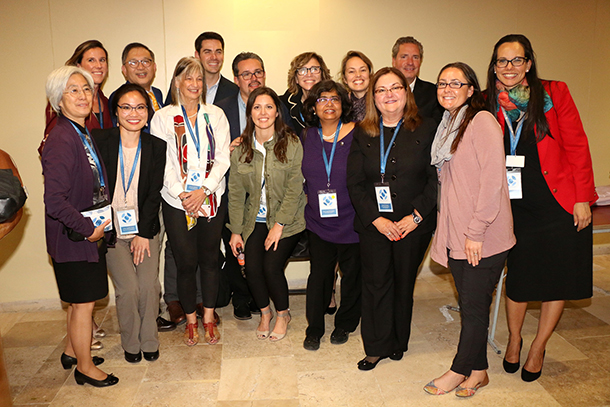Giselle Petzinger, MD, associate professor of neurology (clinical scholar) at the Keck School of Medicine of USC, recently organized Mexico’s first international symposium on lifestyle and neurological disorders. The event brought together 14 USC faculty and staff members from 11 academic departments and seven Mexican researchers specializing in neurological health and drew an audience of 600 doctors and medical students from across Mexico.
The symposium was the inaugural event sponsored by the Don Roberto Gonzalez Barrera Foundation, which was founded by Roberto Gonzalez’s daughter, Bertha Gonzalez, after her father’s passing in 2012. Roberto Gonzalez was a patient of Petzinger’s and a passionate supporter of her research, which focuses on non-pharmacological interventions for Parkinson’s patients.
One of the foundation’s goals has been to share the results of Petzinger’s research, which it continues to support through the USC Roberto Gonzalez Parkinson’s Research Fund, with the medical community in Mexico.
Noting that several top scholars at USC conduct research on the links between lifestyle choices and cognitive health, the symposium was expanded beyond Parkinson’s disease to include discussions on many different aspects of brain health. In addition to the faculty from USC, the speakers included scholars from the medical school at the National Autonomous University of Mexico (UNAM) and Mexico’s national institutes of rehabilitation, aging and neuroscience and neurosurgery. It took place at the National Institute of Rehabilitation in Mexico City.
Petzinger said that the aim was to discuss the data that has been collected in research on lifestyle and the brain and to share how new information about lifestyle and brain health is informing the way some doctors are treating their patients in the clinic.
She noted that the symposium, which drew far more attention and attendance than the organizers had anticipated, created new opportunities for collaboration between USC’s researchers and their counterparts in Mexico.
“It was a wonderful experience and I think it will open up important collaborations in the future,” Petzinger said.
Angela McCracken, director of the USC Mexico office, added that the subject had broad appeal in Mexico, bringing a large crowd of the top academics from throughout the country.
“Thanks to Dr. Petzinger’s passion for brain health and the DRGB Foundation’s vision, USC has been able to partner with four of Mexico’s most prestigious research institutions and accomplish the single largest academic event between USC and Mexico,” McCracken said.
The USC faculty who attended the symposium are: Petzinger; Helena Chui, MD, chair and professor of neurology and Raymond and Betty McCarron Chair in Neurology; William Vega, PhD, Provost Professor of Social Work; Carolee Winstein, PhD, PT, professor of biokinesiology and physical therapy; Lilyana Amezcua, MD, assistant professor of clinical neurology; David Black, PhD, MPH, assistant professor of preventive medicine; Soma Sahai-Srivastava, MD, associate professor of clinical neurology; Ashley Uyeshiro Simon, OTD, assistant professor of clinical occupational therapy; Stan Louie, PharmD, PhD, associate professor of clinical pharmacy; Camille Dieterle, OTD, assistant professor of clinical occupational therapy; Maria Aranda, PhD, MPA, MSW, associate professor of social work; Iris Aguilar, PhD, assistant director of the USC Roybal Institute on Aging at the USC Suzanne Dworak-Peck School of Social Work; and Jessica Lowe, MPH, RD, ketogenic dietician at the USC Comprehensive Epilepsy Center.
— Hope Hamashige


